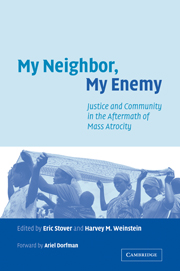Book contents
- Frontmatter
- Contents
- List of contributors
- Foreword by Ariel Dorfman
- Acknowledgments
- Introduction: conflict, justice and reclamation
- Part I Institutional approaches to justice
- Part II Social reconstruction and justice
- Part III Survivors and justice
- Conclusion: a common objective, a universe of alternatives
- Index
Part I - Institutional approaches to justice
Published online by Cambridge University Press: 05 May 2010
- Frontmatter
- Contents
- List of contributors
- Foreword by Ariel Dorfman
- Acknowledgments
- Introduction: conflict, justice and reclamation
- Part I Institutional approaches to justice
- Part II Social reconstruction and justice
- Part III Survivors and justice
- Conclusion: a common objective, a universe of alternatives
- Index
Summary
The Yugoslav and Rwandan Tribunals and the establishment of the International Criminal Court have spawned a growing body of research and debate among legal scholars, political theorists, and social scientists about the efficacy of international criminal tribunals and their objectives. A primary weakness of writings on justice after war and mass atrocity is the paucity of objective evidence to substantiate claims about how well criminal trials achieve the goals ascribed to them. Insufficient attention has been paid to the effects, both positive and negative, that tribunals have had on post-war societies.
The authors in Part 1 examine several judicial and non-judicial responses to mass atrocity, particularly in the former Yugoslavia and Rwanda, and describe how these mechanisms have affected survivors. In Chapter 1, Laurel Fletcher and Harvey Weinstein trace the formation of the International Criminal Tribunal for the former Yugoslavia (ICTY) and the international community's aspirations for what it could accomplish in Bosnia and Herzegovina. Based on interviews with Bosnian judges and prosecutors, the authors argue that international tribunals would have greater legitimacy in local communities if they worked in tandem with, and not in isolation from, national judiciaries. They suggest that international tribunals must develop mechanisms to educate local populations not only about their mandates, methods, rules, and procedures but also about the larger questions of bystander involvement and the role of beneficiaries.
- Type
- Chapter
- Information
- My Neighbor, My EnemyJustice and Community in the Aftermath of Mass Atrocity, pp. 27 - 28Publisher: Cambridge University PressPrint publication year: 2004



